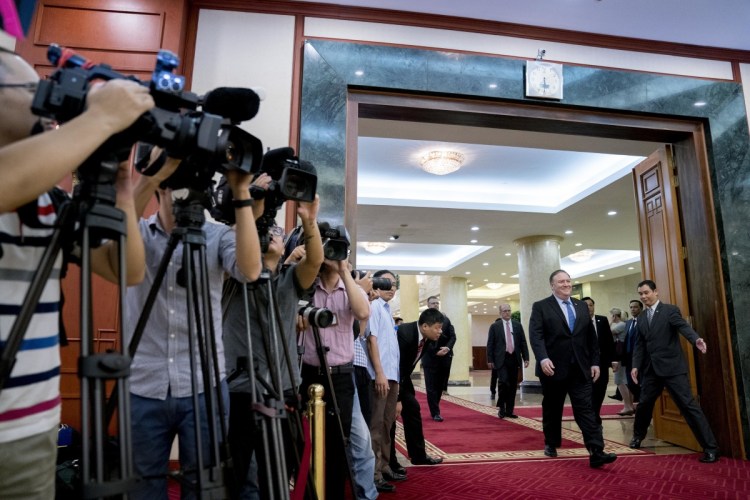TOKYO — Secretary of State Mike Pompeo on Sunday brushed aside North Korea’s accusation of “gangster-like” denuclearization demands.
Pompeo said that his third visit to the country had produced results but also vowed that sanctions would remain until Pyongyang follows through on North Korean leader Kim Jong Un’s pledge to get rid of his atomic weapons.
Pompeo downplayed a harshly critical North Korean statement after the talks in which the country’s foreign ministry bashed hopes for a quick deal and attacked the U.S. for making unreasonable and extortionate demands aimed at forcing it to abandon nuclear weapons. The statement was sure to fuel growing skepticism in the U.S. and elsewhere over how serious Kim is about giving up his nuclear arsenal.

Mike Pompeo
“If those requests were gangster-like, the world is a gangster,” Pompeo said, noting that numerous U.N. Security Council resolutions have demanded that the North rid itself of nuclear weapons and end its ballistic missile program. “People are going to make certain comments after meetings. If I paid attention to the press, I’d go nuts and I refuse to do that.”
Speaking after meeting with his Japanese and South Korean counterparts in Tokyo, Pompeo said his two days of talks in Pyongyang had been productive and conducted in good faith. But after the stinging commentary from the North, he allowed that the goal of denuclearization would be difficult and that much work remains.
“The road ahead will be difficult and challenging and we know critics will try to minimize the work that we have achieved,” he said. He said his talks with senior North Korean officials had “made progress,” and included a “detailed and substantive discussion about the next steps towards a fully verified and complete denuclearization.”
Those include the formation of a working group to determine exactly how North Korea’s denuclearization will be verified and a Thursday meeting with Pentagon officials to discuss the return of remains of American soldiers killed during the Korean War.
Pompeo sought to dispel suggestions that the Trump administration has backed down from demanding the complete, verifiable and irreversible dismantlement of the North’s nuclear weapons. He said North Korea understood that denuclearization must be “fully verified” and “final.”
South Korean Foreign Minister Kang Kyung-wha said that North Korea had balked at a written pledge for “complete, verifiable and irreversible denuclearization” for historical reasons but stressed that the goal remained the same whether or not that exact phrase was used. Fully verified, final denuclearization “isn’t any softer in stating our shared goal of complete denuclearization,” she said.
Despite what he described as progress, Pompeo said the results so far did not warrant any easing of sanctions, which he said would be enforced “with vigor” until North Korea follows through with denuclearization.
After his historic summit with Kim Jong Un in Singapore last month, President Trump declared the North was no longer a threat and would hand over the remains of American soldiers. Yet three weeks later, the two sides were still divided on all the issues, including exactly what denuclearization means and how it might be verified. The promised remains have yet to be delivered.
And, just hours after Pompeo arrived in Tokyo from Pyongyang on Saturday, the North blasted the talks, saying they had been “regrettable.”
In a statement carried by the North’s official Korean Central News Agency, the foreign ministry said the outcome of Pompeo’s talks with senior official Kim Yong Chol was “very concerning” because it has led to a “dangerous phase that might rattle our willingness for denuclearization that had been firm.”
Send questions/comments to the editors.


